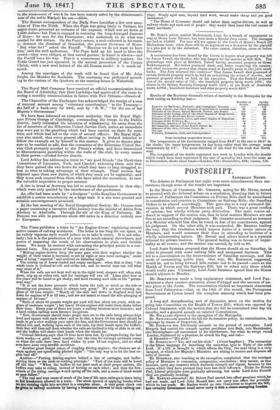POSTSCRIPT.
SATURDAY NIGHT.
The debates in Parliament last night were more miscellaneous than mo- mentous, though some of the results are important.
In the House of Commons, Mr. GREENE, acting for Mr. Hume, moved to proceed with the deferred debate on a resolution, directing that in future sessions of Parliament the Committees on Private Bills shall be assimilated in constitution and practice to Committees on Railway Bills; the Standing Orders to be altered accordingly. This gave rise to a very animated dis- cussion, in which several Members took part. There was a great conflict of opinion; but wholly without party distinction. The main reason ad- duced in support of the motion was, that in local matters Members are not free to act according to their judgment. Mr. GREENE mentioned an instance of a Member who told him that he voted, in fear of his constituents, against his judgment. On the other side, it was contended, Mr. BERNAL leading the way, that the resolution would impose duties of a severe nature on Members, and would consume their time in attending to business of a wholly uninteresting nature. Mr. Bernal and others hinted at a separate tribunal for private business. The general feeling was in favour of impar- tiality at all events; and the motion was carried, by 116 to 88.
Lord JOHN RUSSELL proposed that the House should sit on Saturday, in order to proceed with some railway bills and unopposed business. This led to a conversation on the inconvenience of Saturday meetings, and the mode of economizing public time. One way, Mr. Routh:mit suggested, would be, not to bring forward bills certain not to be passed—such as the Health of Towns and the Railways Bill, but to select only those which would really pass. Ultimately, Lord Joins Russetu agreed that the House should adjourn to Monday.
Mr. BORTHWICK made a long explanatory statement, and Lord PAL- MERSTON a short counter-statement, about Portugal and the amount of no-
tice given to the Junta. The conversation elicited an important statement from Lord Palmerston—that, on the 10th of this month, the Portuguese Government at Lisbon issued the complete amnesty which had been pro- posed.
A long and sharpshooting sort of discussion arose on the motion for going into Committee on the Health of Towns Bill; which was opposed by Colonel SIBTHORP, with the motion that the bill be committed that day six months, and a general assault on salaried Commissions. Mr. WILLIAMS objected to the exemption of the Metropolis. Mr. NEWDEOATE assailed the bill for its tentative policy, its centralization, its espionage by means of Inspectors, &c. Mr. ROEBUCK was felicitously sarcastic on the ground of exemption. Lord Morpeth had carried his crusade against pestilence into Bath, into Manchester, into Birmingham—all succumbed to his interference; but when he swept round London, frightened by a phantom, he struck his flag, and cut— A MEMBER—" His stick."
Mr. Roisinsox—" Yes, and cut his stick." (Great laughter.) The vernacular is the fittest language for describing the somewhat igno de flight of the noble
Lord. If a bill is brought in which affects the City, the next thing is a civio banquet, at which her Majesty's Ministers are sitting to receive and dispense all sorts of incense.
Mr. HOESMAN, also touching on the exemption, complained that the constant policy of Ministers is concession, compromise conciliation: they cannot, at this moment, carry any measure which demands strength and vigour, because by the course which they have pursued they have lost their influence. Under Sir Robert Peel, Liberal principles were gradually advancing, but under Lord John Russell they are gradually receding. Mr. BARNES concurred: Sir Robert Peel carried into effect promises which:he had not made, and Lord John Russell does not carry into effect the promises which he has made. Mr. Bankes would go into Committee to improve the bill; but certainly Government could never carry it with a clause exempting London.


























 Previous page
Previous page